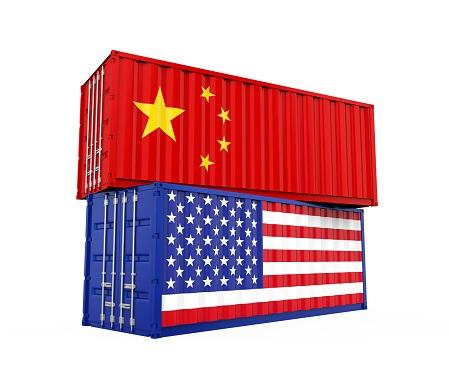Contributing Writer
- FMA
- The Fabricator
- FABTECH
- Canadian Metalworking
Categories
- Additive Manufacturing
- Aluminum Welding
- Arc Welding
- Assembly and Joining
- Automation and Robotics
- Bending and Forming
- Consumables
- Cutting and Weld Prep
- Electric Vehicles
- En Español
- Finishing
- Hydroforming
- Laser Cutting
- Laser Welding
- Machining
- Manufacturing Software
- Materials Handling
- Metals/Materials
- Oxyfuel Cutting
- Plasma Cutting
- Power Tools
- Punching and Other Holemaking
- Roll Forming
- Safety
- Sawing
- Shearing
- Shop Management
- Testing and Measuring
- Tube and Pipe Fabrication
- Tube and Pipe Production
- Waterjet Cutting
Industry Directory
Webcasts
Podcasts
FAB 40
Advertise
Subscribe
Account Login
Search
New tariffs on Chinese goods could hit some fabricators hard
If companies want an exemption, they have to plead their case
- By Stephen Barlas
- April 12, 2018

If U.S. metal fabricators and manufacturers think they are at a competitive disadvantage because of the steel and aluminum tariffs or the just announced China-focused trade penalties, they need to plead their cases to the government.
Metal fabricators that work with steel and aluminum will take a double hit if the White House goes forward with its new 25 percent tariffs against China. However, some political pundits speculate that the mano-a-mano tariff threats between the U.S. and China are simply starting points for what will be a Chinese retreat on some trade barriers, which would negate the need for new U.S. tariffs.
As part of these tariffs, President Donald Trump has targeted a sizable number of Harmonized Tariff Schedule (HTS) codes for iron and steel products. The 25 percent import tariffs on these goods would be in addition to the 25 and 10 percent tariffs on steel and aluminum imports, respectively, from previously announced targeted countries.
The first round of tariffs, announced in March by the U.S. Department of Commerce and overseen by its Bureau of Industry and Security, were based on national security concerns. The U.S. Trade Representative’s (USTR) Office announced the China-only tariffs in early April. They stem from a Trump administration investigation into Chinese policies that require U.S. technology companies to turn over their intellectual property or license it their Chinese entities as the price of being able to sell product in China.
The China tariffs are heavily focused on steel products with HTS codes starting at 72071100, which includes iron or nonalloy steel semifinished products, to 76090000, which covers aluminum fittings for tubes and pipes. The USTR will be holding hearings in May, and companies will have an opportunity in public comments prior to the hearings to argue for omission of any HTS codes from the list. Arguments for exclusion must be based on, according to the USTR, “whether imposing increased duties on a particular product would be practicable or effective to obtain the elimination of China’s acts, policies, and practices, and whether maintaining or imposing additional duties on a particular product would cause disproportionate economic harm to U.S. interests, including small- or medium-sized businesses and consumers.”
To see a list of HTS codes affected, go to www.regulations.gov and input USTR-2018-0005-0001.
Exclusion Requests for Steel/Aluminum National Security Tariffs
Requests for exclusions from the 25 and 10 percent steel and aluminum national security tariffs on imports (except those from Mexico and Canada at the moment) are already being received by the Commerce Department. Among the first two companies to apply are Midas International Group and Zapp Precision Wire. Zapp’s product is high-carbon flat wire, which is also on the China-only tariff list. Midas’ stainless steel sheets are not on the China list mostly because they come from Korea, Taiwan, and the European Union.
The exclusion standard for the all-country national security tariffs is different than for the China-only tariffs: Exclusions will be granted or denied based on whether the steel or aluminum articles are determined not to be produced in the U.S. in a sufficient and reasonably available amount or of a satisfactory quality or based upon specific national security considerations. Requests for exemptions will be made public in dockets BIS-2018-0006 and BIS-2018-0002. Both can be found at www.regulations.gov.
Midas is a sheet metal distributor and importer in California. It placed an order of stainless steel sheets from Taiwan on Dec. 29, 2017, but the shipment arrived in Los Angeles on March 26.
“We think that it is unfair for us to pay 25 percent tariffs for this shipment. A grace period is necessary for this special situation. We understand that we should pay 25 percent tariffs for the future orders,” Rick Li of Midas wrote in a complaint to Commerce Department officials.
Zapp distributes wire products that are manufactured in Germany. Some of that product is exported to Mexico and turned into automotive components.
Neither exclusion request has been denied or granted as this is being written.
subscribe now

The Fabricator is North America's leading magazine for the metal forming and fabricating industry. The magazine delivers the news, technical articles, and case histories that enable fabricators to do their jobs more efficiently. The Fabricator has served the industry since 1970.
start your free subscriptionAbout the Author

Stephen Barlas
- Stay connected from anywhere

Easily access valuable industry resources now with full access to the digital edition of The Fabricator.

Easily access valuable industry resources now with full access to the digital edition of The Welder.

Easily access valuable industry resources now with full access to the digital edition of The Tube and Pipe Journal.
- Podcasting
- Podcast:
- The Fabricator Podcast
- Published:
- 04/16/2024
- Running Time:
- 63:29
In this episode of The Fabricator Podcast, Caleb Chamberlain, co-founder and CEO of OSH Cut, discusses his company’s...
- Trending Articles
Tips for creating sheet metal tubes with perforations

Supporting the metal fabricating industry through FMA

JM Steel triples capacity for solar energy projects at Pennsylvania facility

Fabricating favorite childhood memories

Omco Solar opens second Alabama manufacturing facility

- Industry Events
16th Annual Safety Conference
- April 30 - May 1, 2024
- Elgin,
Pipe and Tube Conference
- May 21 - 22, 2024
- Omaha, NE
World-Class Roll Forming Workshop
- June 5 - 6, 2024
- Louisville, KY
Advanced Laser Application Workshop
- June 25 - 27, 2024
- Novi, MI


























